UNITY — Ashley Morency knew right away that the Sprouts preschool program was the right fit for her daughter, Abbigail.
“She came right in and started playing,” Morency said Friday morning while watching 3-year-old Abbigail play with a worm. “She definitely loves the outdoors.”
Abbigail had a major speech delay, Morency said. She couldn’t get her words out or express herself.
Since coming to Sprouts and working with the staff there, Abbigail has overcome the delay and is now socializing with other children. On Friday, she was showing people the worm in her hand and squealing with excitement.
“It tickles!” she said while holding her hand out so her mother could see the worm.
“The kids that get to come here are just lucky,” Morency said.
Mary Mayhew, state commissioner of the Department of Health and Human Services, was also out in the school’s garden beds Friday morning. She said she was visiting the Sprouts program because there is value in seeing “innovative programs and models.”
“We all like to play in the dirt,” said Mayhew, who oversees the department in charge of childcare in the state. “(…) A lot of what we try to do with all of our programs is support getting information out,” so that others can learn from them. “How do we help support kids being ready to learn?”
‘GEAR AND COMMITTING’
Jill Barnes, a teacher at the Sprouts program provided by Broadreach Family and Community Services and housed at Unity Elementary School, said she’s seen a number of children overcome behavioral issues after attending the nature-based preschool.
Broadreach provides a number of services to help both children and adults in Waldo and Knox counties develop skills and lead healthy lives.
In addition to Sprouts, Broadreach provides a traditional pre-K program. It also provides services to children through Youthlinks, an out-of-school program to empower youth, and prevention services for young people who are considered at-risk.
Barnes, who’s been with Broadreach for 16 years, credits the improvements in her students to the outdoors environment and the larger space the children have with the new Sprouts program.
“It’s a different pace that is child-led and centered on the child’s interest,” she said.
Broadreach started Sprouts, which serves 21/2 to 5-year-olds, about a year ago, said Deb Hensley, director of the early childhood program at the nonprofit.
“We had been for years wanting to do more with the outdoors,” Hensley said. “(…) We all decided it was so important in this day and age, when the children and parents are obsessed with technology, that we balance it out.”
They visited Juniper Hill School in Alna, which follows the place-based education model — learning that is rooted in the local environment — and uses nature to teach its children.
Hensley said they were skeptical of the program before they went and worried about how difficult it would be to recreate. But once they saw it firsthand and learned from those at the program that it was really about “gear and committing,” they decided to run a pilot program.
Now, 16 children and six staff members are involved in the Unity program, as well as 26 children at the location in Belfast. About 50 percent of the children have special needs, so Sprouts receives some state funding.
The rest of the money comes from tuition, which is $170 per week for five days of care, and any grants the organization can win.
The children spend at least four hours outside every day, rain or shine. They wear Muddy Buddy rainsuits that look like miniature hazmat suits in bad weather, Hensley said.
The teachers required a change in mindset. Instead of using typical plastic equipment for an activity, Barnes said, they would think about what they could use in nature instead.
‘LIKE NIGHT AND DAY’
Forest kindergartens, where children spend all of their time outdoors, started in Europe decades ago.
The first nature-based preschool was started in 1967 in New Canaan, Connecticut, according to Patti Bailie, an assistant professor of early childhood education at the University of Maine at Farmington. In the United States, nature-based preschools, which spend a portion of their time outdoors, are more popular than forest kindergartens.
By one estimate, there are now about 180 nature-based preschools in the country, she said.
“It’s been amazing to see the growth of the programs and of the interest,” said Bailie, who founded the Schlitz Audubon Nature Preschool in Milwaukee, Wisconsin, in 2003.
The growing interest makes sense, she said, when looking at the research on the benefits of letting children learn in nature.
“Nature is a good vehicle for children,” Bailie said, where they can develop physically, cognitively and emotionally.
Children in nature-based programs tend to have better developed motor skills, be more confident and engaged, and be better at solving problems.
Some studies show that taking a walk outside can reduce the symptoms of attention deficit disorder as much as taking medications in some cases, she said.
The outdoors is also good for brain development, 85 percent of which develops during the preschool years, according to Bailie. Exercise, multi-sensory experiences and working out problems can all help develop the brain.
Bailie said that she would “love” to see more schools incorporating nature into early education, “especially because I think that schools are not made for children when you have to sit in seats all day.”
“If they’re not doing things that children really need, you see more behavior problems, you see more diagnoses of ADD,” she added.
When Hensley was asked if she’s seen a difference in the children since switching to a nature-based model, she said she might start crying.
“It’s like night and day,” she said. “The behaviors that we see inside, they’re pretty much gone outdoors.”
The parents have also noticed a change, she said. Their children have a better appetite and fall asleep easier.
“It’s where children should be,” she said.
RISING INTEREST
There is a forest kindergarten at White Pine in York, but Hensley said she didn’t know of any other schools with programs similar to Juniper Hill and Sprouts.
Bailie could think of a few that were starting up in southern Maine, but not many in central or western Maine, she said, although there are a number of conferences throughout the state on the topic each year.
“In our area, I think there’s more interest, I think it’s starting to happen,” she said. Bailie is hoping to push the university’s childcare center on campus toward a nature-based model, and she wishes other universities would include it in their coursework so teachers would be more prepared to work at nature-based schools.
One of the barriers to this alternative style of learning is training for teachers, she said, as well as access to natural areas, resources and funding.
At Sprouts, funding challenges are a constant since it switched to a tuition model. Hensley won a $10,000 grant from the Davis Foundations in Yarmouth that provided training for the teachers.
Nature-based programs also have to defend themselves against those who want to focus on academics, Bailie said. Experiential education “provides a foundation for academics,” she said, that is “more meaningful for children.”
SECRET LEARNING
Mayhew, dressed in a gray T-shirt, jeans and sneakers, gets down next to a garden bed with some of the children. She rakes through the soil until she finds a worm, and the children, Ada Miller and Abbigail, are rapt with excitement. Ada takes the worm from Mayhew and holds it up to some of the parents, but quickly lets it fall when it “tickles” her.
Later, they pick up spades and Mayhew hands out seeds to those who ask, pointing out the differences in the seeds’ shapes before placing one in the earth with a spade. They place seeds for squash and corn in the soil of the bed that will be called the “three sisters garden,” Barnes said.
Barnes is teaching them how to garden using tools and boxes donated by Walpole Woodworkers, Johnny’s Selected Seeds and Hawk Ridge. She also fixed an old hoop house on the property, where they are growing potatoes and tomatoes. The food will go in the kids’ lunches, she said, or they will pick and eat it as they please.
The children learn in many of the same ways they did inside the classroom, but with natural materials, Barnes said.
At the Sprouts program, the children have created their learning space, she said. They ignore most of the playground equipment and go straight for the garden beds, the dirt, the tree stumps and the mini mud kitchen. Throughout Mayhew’s visit on Friday, they moved from one spot to another fluidly, each gravitating toward something that caught their interest.
They count with acorns and pine cones, hunt for letters around the yard, read books to each other while sitting on tree stumps, measure and compare worms, and sing songs outside.
“Kids go around learning behind our backs all the time,” Hensley said.
Madeline St. Amour — 861-9239
mstamour@centralmaine.com
Twitter: @madelinestamour
Send questions/comments to the editors.


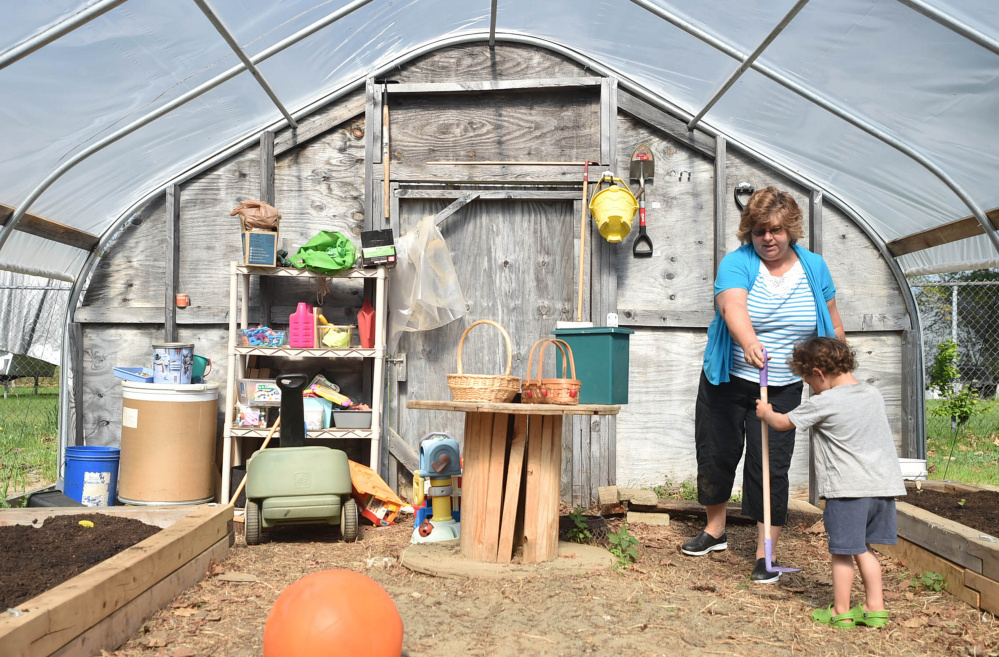
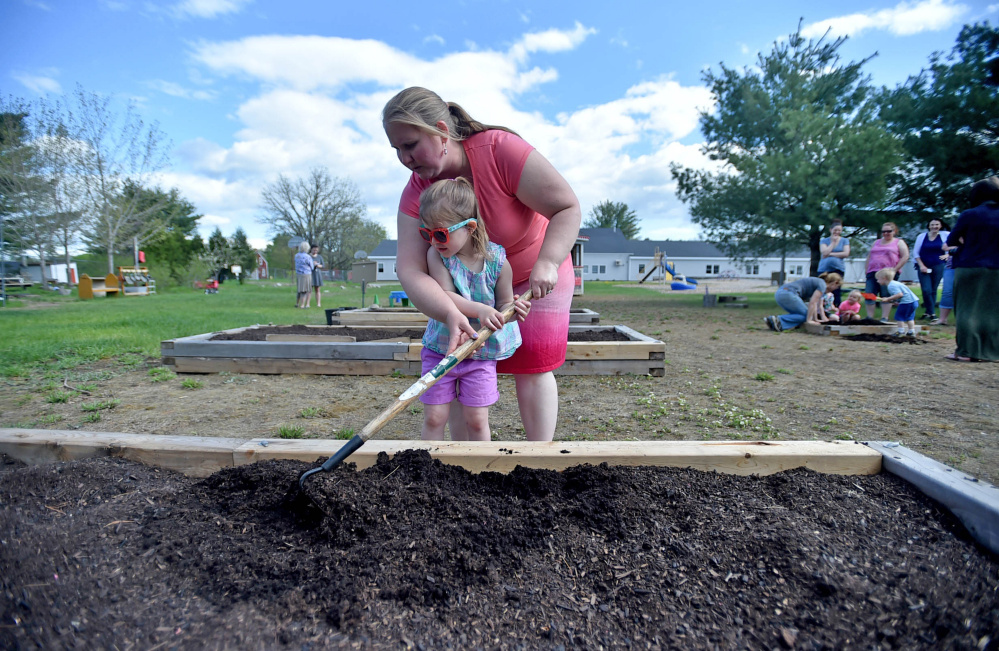
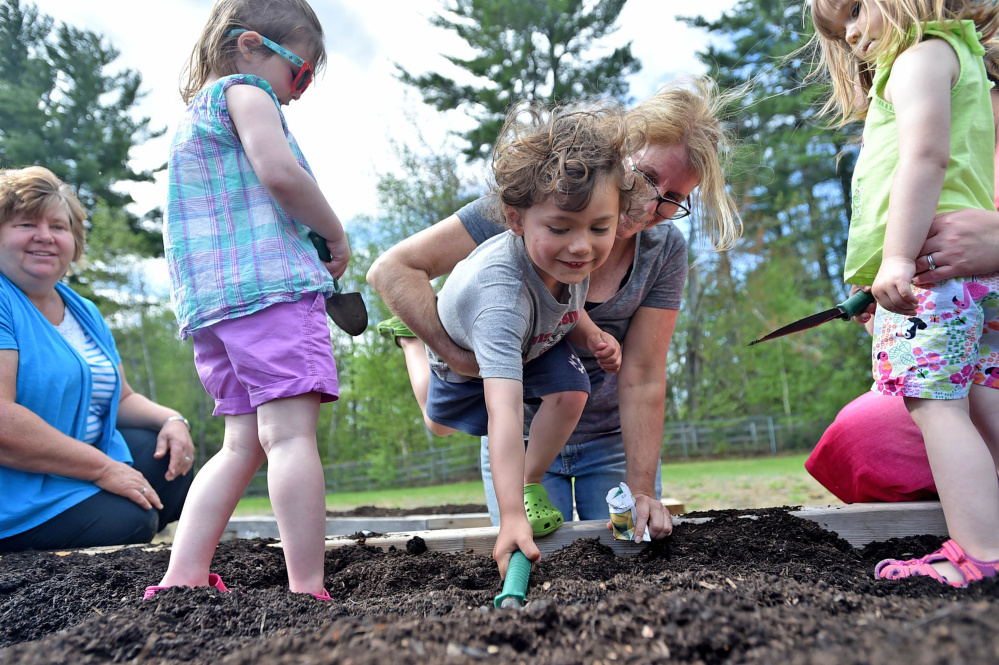

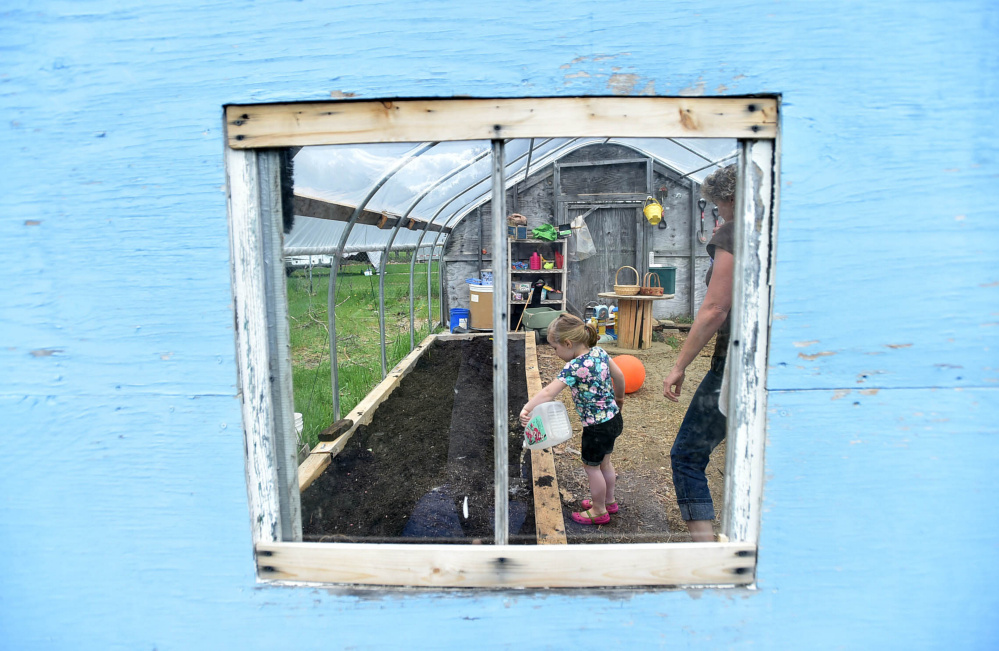
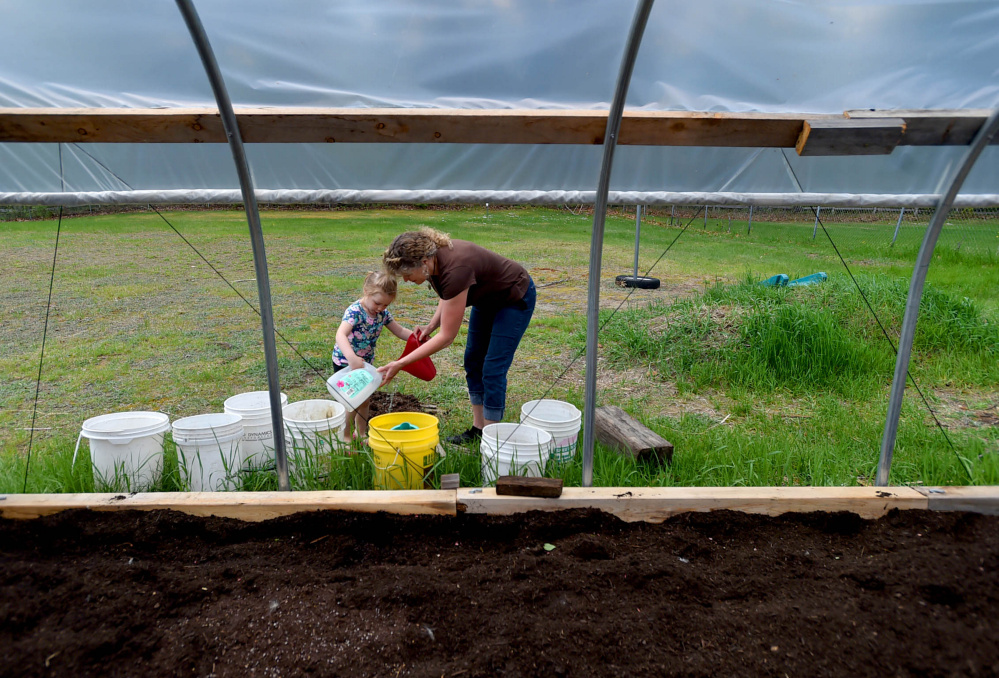
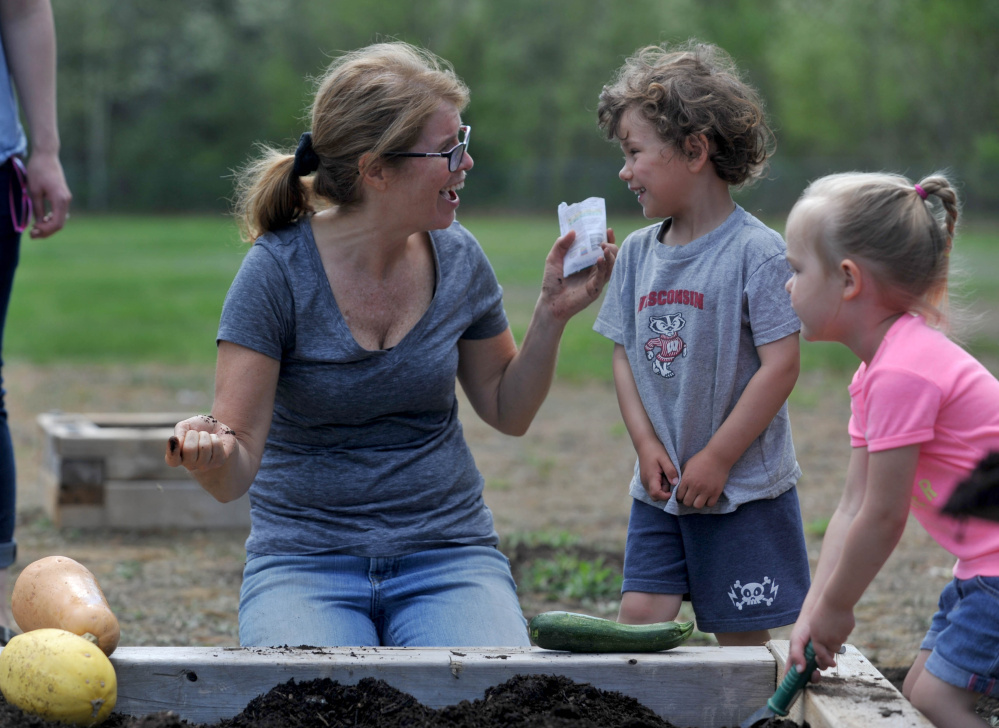
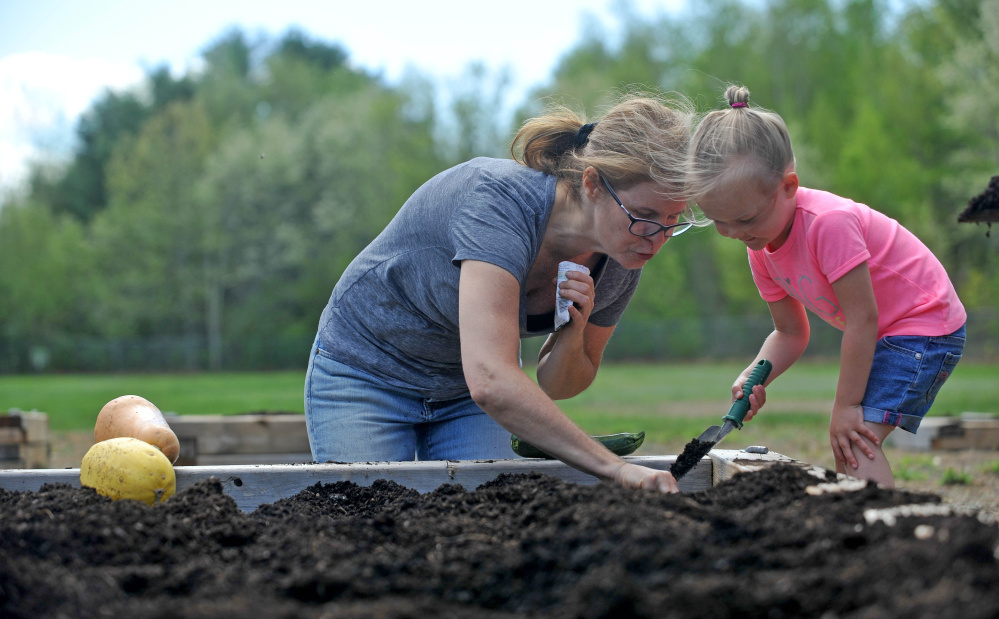

Success. Please wait for the page to reload. If the page does not reload within 5 seconds, please refresh the page.
Enter your email and password to access comments.
Hi, to comment on stories you must . This profile is in addition to your subscription and website login.
Already have a commenting profile? .
Invalid username/password.
Please check your email to confirm and complete your registration.
Only subscribers are eligible to post comments. Please subscribe or login first for digital access. Here’s why.
Use the form below to reset your password. When you've submitted your account email, we will send an email with a reset code.